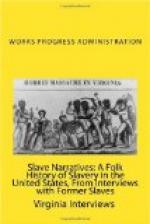De feed us plenty. We had pork, corn, rabbit, dey hed eberythin’ nice. Dey made us stan’ up to eat. Dey no low us sit down to eat. Der wuz bout twenty or thirty slaves on de farm an some ob dem hed der own gardens. Anythin’ dey gib us to eat I liked. Dey had bees and honey.
I wore little calico dress in de summer, white, red, and blue. Some hed flowers and some hed strips. We went barefooted until Christmas. Den dey gabe us shoes. De shoes were regular ole common shoes; not eben calfskin. Dey weaved linen and made us our clothes. Dey hab sleeves, plain body and little skirt. I hed two of dem for winter.
I hab seen lots of slaves chained together, goin’ south, some wuz singin’ and some wuz cryin’. Some hed dey chillun and some didn’t.
Dey took me to church wid dem and dey put me behind de door. Dey tole me to set der till dey cum out. And when I see dem cumin’ out to follow behind and get into de carrage. I dursent say nothin’. I wuz like a petty dog.
INTERVIEW OF EX-SLAVE FROM VIRGINIA
Reported by Rev. Edward Knox
Jun. 9, 1937
Topic: Ex-slaves
Guernsey County, District #2
JENNIE SMALL
Ex-slave, over 80 years of age
I was born in Pocahontas County, Virginia in the drab and awful surroundings of slavery. The whipping post and cruelty in general made an indelible impression in my mind. I can see my older brothers in their tow-shirts that fell knee-length which was sometimes their only garment, toiling laborously under a cruel lash as the burning sun beamed down upon their backs.
Pappy McNeal (we called the master Pappy) was cruel and mean. Nothing was too hard, too sharp, or too heavy to throw at an unfortunate slave. I was very much afraid of him; I think as much for my brothers’ sakes as for my own. Sometimes in his fits of anger, I was afraid he might kill someone. However, one happy spot in my heart was for his son-in-law who told us: “Do not call Mr. McNeal the master, no one is your master but God, call Mr. McNeal, mister.” I have always had a tender spot in my heart for him.
There are all types of farm work to do and also some repair work about the barns and carriages. It was one of these carriages my brother was repairing when the Yankees came, but I am getting ahead of my story.
I was a favorite of my master. I had a much better sleeping quarters than my brothers. Their cots were made of straw or corn husks. Money was very rare but we were all well-fed and kept. We wore tow-shirts which were knee-length, and no shoes. Of course, some of the master’s favorites had some kind of footwear.
There were many slaves on our plantation. I never saw any of them auctioned off or put in chains. Our master’s way of punishment was the use of the whipping post. When we received cuts from the whip he put soft soap and salt into our wounds to prevent scars. He did not teach us any reading or writing; we had no special way of learning; we picked up what little we knew.




